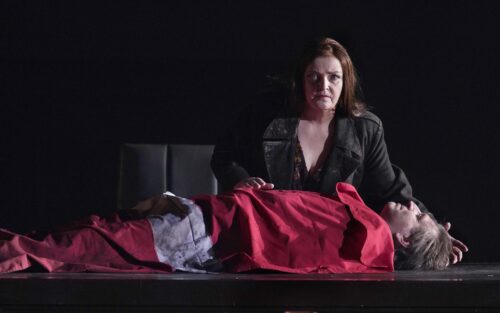 Spain Wagner, Götterdämmerung: Teatro Real Chorus and Orchestra / Pablo Heras-Casado (conductor). Teatro Real, Madrid, 23.2.2022. (JMI)
Spain Wagner, Götterdämmerung: Teatro Real Chorus and Orchestra / Pablo Heras-Casado (conductor). Teatro Real, Madrid, 23.2.2022. (JMI)

Production:
Director – Robert Carsen
Sets and Costumes – Patrick Kinmonth
Lighting – Manfred Voss
Chorus master – Andrés Máspero
Cast:
Brünnhilde – Ricarda Merbeth
Siegfried – Andreas Schager
Hagen – Stephen Milling
Gunther – Joachim Goltz
Gutrune – Amanda Majeski
Waltraute – Michaela Schuster
Alberich – Martin Winkler
Norns – Claudia Huckle, Kai Rüütel, Amanda Majeski
Woglinde – Elizabeth Bailey
Wellgunde – María Miró
Flosshilde – Claudia Huckle
Teatro Real has been offering Der Ring des Nibelungen at the rate of one opera a year, which has now come to an end with Götterdämmerung. Unfortunately, Covid prevented me from attending Siegfried last season. I hope that in the future Teatro Real will offer the entire Ring cycle in one season, which would be the first time since they reopened. In fact, the last time the Ring was seen in Madrid was in 2004, and it was also done over several seasons.

As with the earlier operas in the cycle, the production is the well-known one by Robert Carsen. It premiered at the Cologne Opera in 2000 and could be seen in Barcelona in 2016. The underlying idea is nothing less than the ecological allegation that human selfishness is killing the planet. The Rhine as rubbish dump: this concept is always present and is developed well, although I end up missing certain touches of genius that Robert Carsen has accustomed us to throughout his career. From an aesthetic point of view, I think his production of Götterdämmerung is the most successful in the entire cycle.
The opera opens with the Norns on that rubbish dump; Brünnhilde’s rock is seen in a bare space with a fire at the back. The Gibichung Hall is a large room with a big desk in the center and two big maps of the Rhine. It is here where Siegfried’s arrival takes place, along with the entire second act and the final part of the third. The death of Siegfried brings us back to the dirty riverbed. Brünnhilde’s Immolation Scene is the best achieved one in the entire production: a stage almost in darkness allows for striking images of her death. The costumes are brought up to modern times, and the lighting is outstanding, particularly in that final scene.
As in the previous Ring operas, Pablo Heras-Casado was the conductor, and his reading was thoroughly convincing – even brilliant at times. The best moments were the emotional Funeral Music of Siegfried, and Brünnhilde’s Immolation. While the conducting was remarkable, there was a drawback in the positioning of the orchestra: some of the musicians occupied the side boxes of the stalls, with the harps on the left and the brass on the right. I had the misfortune of being seated practically beneath the boxes on the right, and when the brass entered, the sound was very unbalanced, leaving the strings almost inaudible. Let us hope that normal times return soon and the whole orchestra can finally be in the pit. Both orchestra and chorus gave excellent performances.
Brünnhilde was sung by soprano Ricarda Merbeth, who gave a solid interpretation on the whole. However, I don’t find that she is well-suited vocally for the role: her voice lacks the amplitude it demands and also falls somewhat short in the lower part of her voice. She is a good singer and performer but perhaps not a Brünnhilde.
Tenor Andreas Schager as Siegfried was excellent vocally and dramatically. There is no doubt that Schager is among the top Siegfrieds of today.
The evil Hagen was played by bass Stephen Milling, a frequent interpreter of the character. I found him weaker than on past occasions: his voice did not carry with its former ease, which was especially noticeable in Acts I and III, though things went better for him in the second act.
As Gutrune, soprano Amanda Majeski offered an attractive, appropriate voice and moved nicely on stage. In the first scene, she doubled as a Norn. Baritone Lauri Vasar canceled and was replaced by Joachim Goltz, who was good, although his vibrato was too wide on more than one occasion. Veteran Martin Winkler was once again Alberich in the scene where he appears in a dream to his son, Hagen. He was reliable as usual.
Michaela Schuster as Waltraute impressed in her big scene with Brünnhilde, where she asks her to give up the ring Siegfried gives her. And there were fine performances by the Norns and the Rhine daughters.
José M. Irurzun
